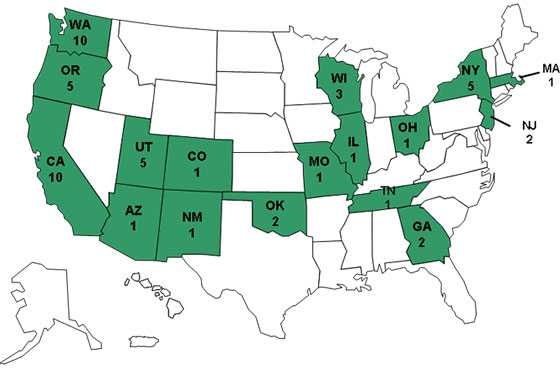Multistate Outbreak of Salmonella Litchfield Infections Linked to Cantaloupes (FINAL UPDATE)
NOTICE: This outbreak is over. The information on this page has been archived for historical purposes only and will not be updated.
Posted April 2, 2008
Outbreak Summary
CDC is collaborating with public health officials in multiple states across the United States and with the U.S. Food and Drug Administration (FDA) to investigate a multi-state outbreak of Salmonella Litchfield infections. An investigation that used interviews comparing foods eaten by ill and well persons is showing that cantaloupe from Honduras is the likely source of the illnesses.
As of April 2, 2008, state health departments identified 51 ill persons in 16 states infected with Salmonella Litchfield with the same genetic fingerprint. Ill persons with the outbreak strain have been reported from Arizona (1 person), California (10), Colorado (1), Georgia (2), Illinois (1), Missouri (1), New Jersey (2), New Mexico (1), New York (5), Ohio (1), Oklahoma (2), Oregon (5), Tennessee (1), Utah (5), Washington (10), and Wisconsin (3). Onset dates, which are known for 50 patients, ranged from January 10 to March 10, 2008. Their ages range from 1 to 93 years; 59% are female. At least 16 persons have been hospitalized. No deaths have been reported. In addition, 9 ill persons with the outbreak strain have been reported in Canada.
Investigation of the Outbreak
Investigators defined a case as infection on or after January 1, 2008 with the outbreak strain of Salmonella Litchfield. In an epidemiologic study, ill persons answered questions about foods consumed during the days before becoming ill and investigators compared their responses to those of well persons. The study indicates that cantaloupe is the likely source of infections.
The Food and Drug Administration issued an import alert regarding entry of cantaloupe from one Honduran company, Agropecuaria Montelibano. The import alert advises that all cantaloupes shipped to the United States by this company be detained. In addition, the FDA is advising United State grocers, food service operators, and produce processors to remove from their stock any cantaloupes from this company.
The FDA is working collaboratively with Honduran Government officials and Agropecuaria Montelibano to investigate the source of contamination.
All importers have recalled the cantaloupes they purchased from Agropecuaria Montelibano.
Final Case Count Map
Persons infected with the outbreak strain of Salmonella Litchfield, by state of residence, as of April 2, 2008 (n=51)

As of April 2, 2008, state health departments identified 51 ill persons in 16 states infected with Salmonella Litchfield with the same genetic fingerprint. Ill persons with the outbreak strain have been reported from Arizona (1 person), California (10), Colorado (1), Georgia (2), Illinois (1), Missouri (1), New Jersey (2), New Mexico (1), New York (5), Ohio (1), Oklahoma (2), Oregon (5), Tennessee (1), Utah (5), Washington (10), and Wisconsin (3).
Clinical Features
Most persons infected with Salmonella develop diarrhea, fever, and abdominal cramps 12–72 hours after infection. Infection is usually diagnosed by culture of a stool sample. The illness usually lasts 4 to 7 days. Although most people recover without treatment, severe infections may occur. Infants, elderly persons, and those with impaired immune systems are more likely than others to develop severe illness. When severe infection occurs, Salmonella may spread from the intestines to the bloodstream and then to other body sites, and can cause death unless the person is treated promptly with antibiotics.
Advice to Consumers
These products may still be in grocery stores and in consumers’ homes. Consumers who have cantaloupe in their homes can check with the place of purchase to determine if the fruit came from this Honduran company. Cantaloupe from this company should be discarded and not consumed. No illness has been linked to cantaloupe from other sources.
- Page last reviewed: April 2, 2008
- Page last updated: April 2, 2008
- Content Source:


 ShareCompartir
ShareCompartir